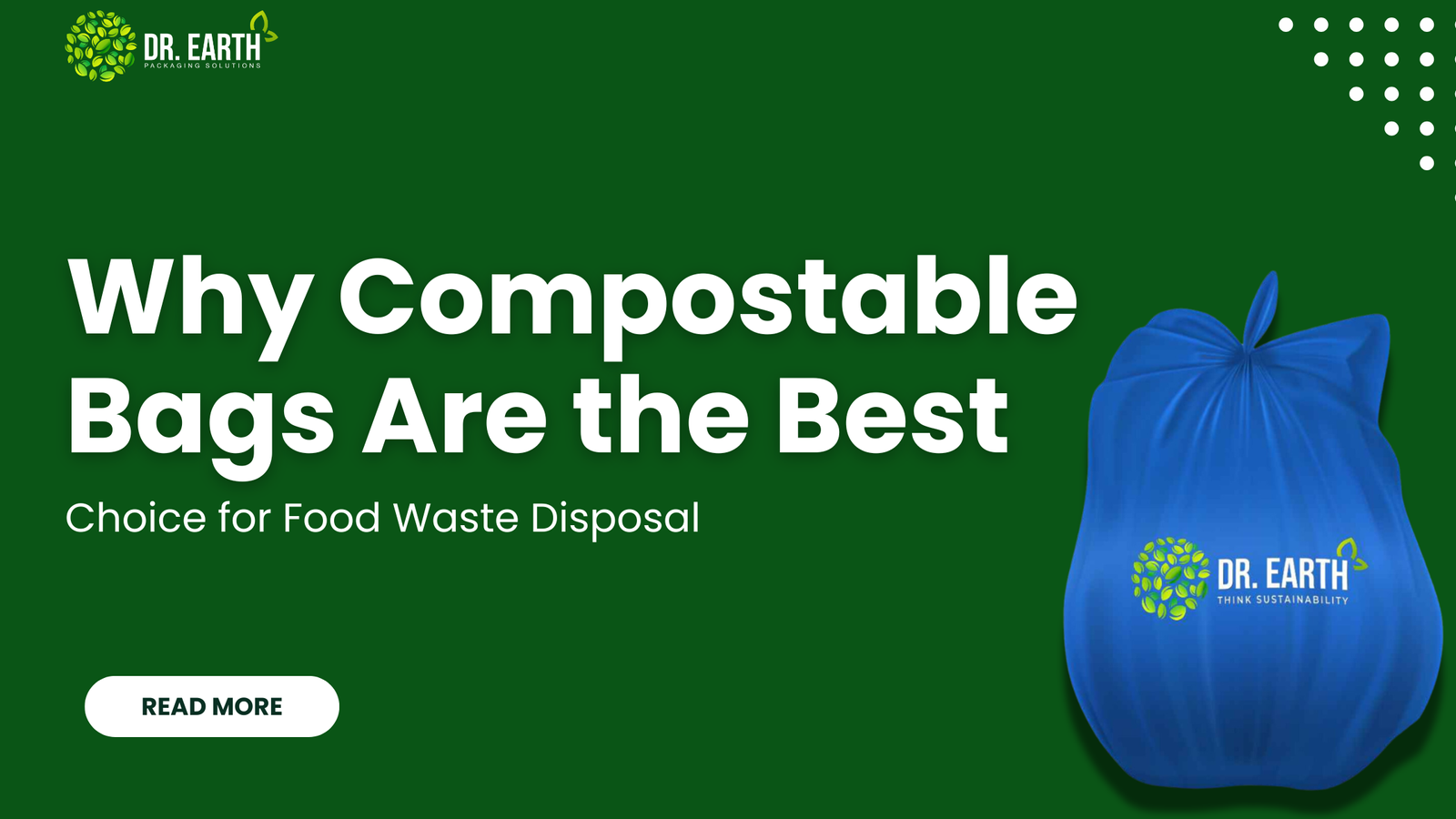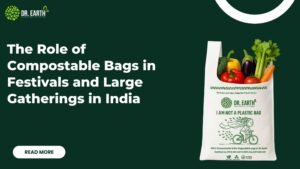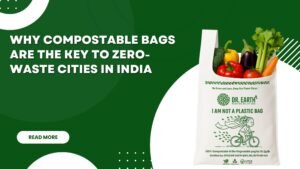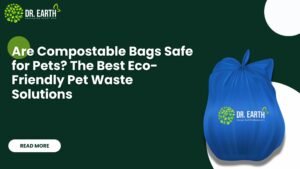
In times of today when sustainability heads most environmental impacts conversations, sustainable use of waste has gone to the extent to use eco-friendly materials that can turn back their effects on human existence in positive manners. Compostable bags have emerged, offering food waste management responsible by most consumers. Different from plastics that take decades before breaking down, compostable bags biodegrade effortlessly while bringing value nutrients for reuse. In the next post, we will learn why compostable bags are the best way to dispose of food waste and how they work, while considering why Dr. Earth’s compostable bags are a good choice for the environmentally conscious consumer.
Understanding Compostable Bags and Their Benefits
What Are Compostable Bags?
Compostable bags are organic-based, made from materials like corn or potato starch and completely decompose in a composting environment. They not only degrade into natural elements but also enhance the quality of the soil while they break down. This makes them ideal for food waste disposal.
Key Benefits of Using Compostable Bags for Food Waste Disposal
- Environmentally Friendly
Compostable bags leave a lesser burden in landfills since they are biodegradable. These do not emit toxic residues into soil and water; they just leave no trace of microplastics like plastic. - Promote Soil Health
The contents in compostable bags are nutrient replenishers to the earth when these decompose. This makes it an essential component when it comes to composting food waste because it readily contributes to forming fertile earth. - Support a Plastic-Free Future
Users, by selecting compostable from the other types of plastics, therefore reduce global plastic pollution affecting wildlife and, in turn, human health.
How Compostable Bags Are Different from Biodegradable Bags
Many are confused as to which of the compostable or biodegradable bags, but basically there is an important distinction between the two. A biodegradable bag, after several years, would break down and not directly turn into something that contributes to making soil. It takes more time for them to break down and, at the end, give organic matter to soil when they decay.
Advantages of Compostable Over Biodegradable Bags
- Complete Breakdown: They are able to break down completely without any trace as opposed to other biodegradable bags that can leave minute plastic material.
- Quicker Decomposition: Compostable bags decompose faster than biodegradable bags, which sometimes must be subjected to particular conditions to totally decompose.
- Nutrient-Rich Output: Food waste composting with compostable bags yields an excellent nutrient-filled compost that can be used for gardening and agriculture.
The Role of Compostable Bags in Food Waste Management
Why Food Waste Disposal Matters
There is the generation of millions of tons of food waste that needs to be disposed of in a sustainable manner. Composting food waste using compostable bags excludes food waste from landfills and feeds the soil without harmful chemicals being involved.
How Compostable Bags Simplify Food Waste Disposal
- Odor Control
Compostable bags minimize food waste odors since they contain the organic matter securely until it is placed inside the composting bin. - Hygienic Solution
Compostable bags ensure that the food waste is kept enclosed, reducing direct contact and, at the same time, aiding in keeping the waste neat while moving to the composting sites. - Convenience and Versatility
Compostable bags are strong enough to handle both wet and dry food waste. It therefore makes waste disposal easy.
Why Choose Dr. Earth’s Compostable Bags for Food Waste Disposal
Made with the planet in mind, Dr. Earth is one of the market-standout compostable bag manufacturers. Here’s why.
- Eco-Certified and Approved
This is a CPCB, CIPET, and CTO-certified product; this means that it has fulfilled the ultimate level of standard for any compostable item. That is why a consumer who has used bags from Dr. Earth feels confident that they are absolutely compostable and most earth-friendly. - Made from Plant-Based Materials Since the materials used are from corn and potato starch, this is a very effective green alternative to petroleum-based plastics. This way, in case a Dr. Earth bag gets into the environment, it will eventually decompose without harming an ecosystem.
- Toxin-Free Decomposition
The use of Dr. Earth compostable bags does not carry toxic chemicals that will possibly produce toxins when they degrade, making them safe to the soil, water, and plants.
Composting at Home with Dr. Earth Bags: A Quick Guide
Getting Started with Home Composting
If you are a beginner in composting, using Dr. Earth compostable bags is a great way to manage food waste efficiently. Here’s a quick guide:
- Separate Organic Waste
Start by separating compostable items, such as fruit and vegetable scraps, coffee grounds, and eggshells, from non-compostable waste. - Bag It Right
Put the food waste in a Dr. Earth compostable bag, which will be broken down with the food waste and become part of the compost. - Add to Compost Bin
Take the bagged food waste and put it in your compost bin, or you can take it to the community composting site if you do not have the space for a bin in your home. - Aerate and Monitor
Since composing requires oxygen, compost must be turn regularly for good breakdown of materials.
Environmental Impact of Compostable Bags
Reducing Greenhouse Gas Emissions
When organic waste decomposes in landfills, it releases methane, a powerful greenhouse gas. Composting food waste with compostable bags, such as Dr. Earth, reduces methane emissions because the process promotes aerobic decomposition, which doesn’t produce methane.
Combating Soil Degradation
Soil degradation occurs throughout the world. Composting of your food waste in our compostable Dr. Earth bags has helped replenish nutrients in the soil, making plants grow and reducing more erosion.
How Dr. Earth’s Compostable Bags Support Sustainable Living
Dr. Earth supports sustainable living by providing compostable bags to every consumer. From sourcing from sustainable materials to ensuring the products break down safely in a natural environment, every step of the product life cycle for Dr. Earth ensures the well-being of the planet.
Compostable Bags and the Circular Economy
This will bring a circular economy whereby resources are use in a reduction, reuse, and recycle manner, not causing waste but a closed system. The compostable bag helps bring this about in that, after its usage, it will go back to the earth as nutrient matter. Dr. Earth’s bags help both home and business be part of this circular process while at the same time reducing their dependency on single-use plastic and having a healthier environment.
Why Compostable Bags Are the Future of Waste Management
Compostable bags are the immediate future of waste management now that more consumers are looking towards sustainable alternatives. Unlike the plastic bags that take almost centuries to decompose, compostable bags are actually a practical and eco-friendly solution that is in line with today’s environmental priorities.
The Benefits of Transitioning to Compostable Bags
- Community and Global Impact
It reduces the waste that ends up in landfills and, on the other hand, fosters a greener lifestyle when cities and communities are encouraging the composting of using compostable bags. - Long-Term Savings
Compostable bags have a higher cost than plastic, but their long-term cost savings on landfills and soil quality make them well worth investing in the long run. - Encouraging a Change in Habits
By using compostable bags, one promotes the environmentally friendly nature of such a practice and inspires other people to embrace the practice.
Conclusion
Compostable bags will make the disposal of food waste much easier. In addition to reducing plastic waste, it encourages a healthy management of food waste. For those seeking an eco-friendly alternative in households and businesses, Dr. Earth compostable bags are the effective alternative for them. Whenever you dispose of food waste with compostable bags, you contribute to a better environment while making a future sustainable for future generations.
FAQs
Q- 1. How long do compostable bags take to decompose?
Ans- Compostable bags, including Dr. Earth, breakdown in a composting environment for 3 to 6 months depending upon the temperature and moisture content.
Q- 2. Can I use compostable bags for any type of waste?
Ans- Generally, the compostable bags are suitable for food waste and organic materials. Use them not for anything that does not decompose normally.
Q- 3. Are Dr. Earth compostable bags certified?
Ans- Yes, the compostable bags produced by Dr. Earth hold the certifications of CPCB, CIPET and CTO, which issue them with the highest rated standard of compostable product certification.
Q- 4. How are compostable bags better than biodegradable bags?
Ans- In comparison, compostable bags decompose completely with residue-free harmful effects; a few biodegradable products might leave behind some bits of plastic.
Share:
Related Posts














